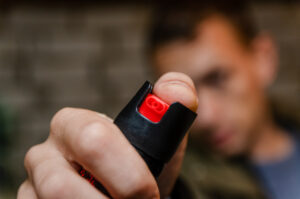The substance known as pepper spray, capsaicin spray, or sometimes commercially known as Mace, has been a subject of controversy over recent years in Canada and particularly in Alberta. While many people regard it as a tool of self-defence or protection, the law currently classifies pepper spray as a prohibited weapon that is not legal to own or use.
Amid an uptick in violent attacks across the province—many of them racially motivated and/or targeting women and other vulnerable groups—a local Justice Minister sent a letter to Federal officials in 2021, later made public, imploring them to consider allowing civilians to carry pepper spray for self-defence purposes (the Criminal Code must be amended at the Federal level to authorize such changes). The request was ultimately denied, citing the potential to increase or escalate violence—but with the issue now raised in the public consciousness, it’s important to know where the law stands and what your rights are should you fall victim to an attack or need to defend yourself.
Read on to learn more about Canada’s self-defence laws pertaining to pepper spray, or talk to a lawyer from Chadi & Company if you face legal consequences for using the substance to protect yourself.
Table of Contents
What is pepper spray?
Pepper spray (including the brand Mace, with which the term pepper spray is often used interchangeably) is a chemical agent made with the naturally-occurring substance oleoresin capsicum (OC), a distillate from plants of the Capsicum genus—chilli peppers. Developed in the 1970s, pepper spray functions similarly to tear gas: causing tremendous eye pain and tearing, irritation of the skin upon contact and burning in the respiratory tract upon inhalation.
Because pepper spray temporarily but non-lethally incapacitates its target, making breathing, seeing and speaking painful and difficult, it is often used by law enforcement and military agencies for the purpose of crowd and riot control and is widely available for civilian self-defence use in the United States. Sprays are sold in a number of different delivery devices, including aerosol cans of varying sizes, small canisters meant for personal use and large canisters meant for use in larger crowds. Those designed for crowd and riot control discharge a fine, fog-like mist that covers a vast area, while those designed for personal use shoot a single stream of pepper spray that must be aimed more precisely at an attacker or target.
Despite being considered safe to use as directed and necessary, complications from exposure to pepper spray (and particularly overexposure) are possible and can have lasting effects, including serious burns, vision loss and worsening of pre-existing medical conditions. It’s understandable that many Canadians are torn on whether pepper spray should be treated legally as a weapon or as a measure of self-defence.

Is pepper spray illegal in Canada?
As the law stands, pepper spray is classified as a prohibited weapon. The Firearms Act defines the following among the weapons to be regulated under the Criminal Code:
Any device designed to be used for the purpose of injuring, immobilizing or otherwise incapacitating any person by the discharge therefrom of
- (a)tear gas, Mace or other gas, or
- (b)any liquid, spray, powder or other substance that is capable of injuring, immobilizing or otherwise incapacitating any person.
The Firearms Act also categorizes weapons as non-restricted, restricted or prohibited depending on their characteristics and uses the term “weapon” in reference to any item “designed, intended or used to cause death or injury to another person or to threaten or intimidate,” as defined in the Criminal Code. As pepper spray has been labelled a prohibited weapon, the Criminal Code of Canada outlaws its possession, use and transport into the country.
Are there any exceptions to pepper spray possession laws?
Indeed, there are certain exceptions to the ban on pepper spray possession and use. Anyone with a valid Firearms Acquisition Certificate or an Authorization to Carry may purchase and carry pepper spray legally (however, its use for non-defensive purposes remains outlawed). Those who qualify for these exceptions are largely involved in law enforcement or work for the government and obtain authorization to possess, use and transport pepper spray solely in the course of their profession or for public safety.
Additionally, an exception is made specifically for bear spray (sometimes called bear mace), which is a product designed specifically for use against bears and other dangerous animals for the purpose of pest control and protection. While bear spray and pepper spray are both made from oleoresin capsicum, bear spray is legal to own (despite often containing the OC agent at higher concentrations) because it is not intended for use on or against humans. Of course, using bear spray against another person or for any purpose other than pest control remains illegal, as it would then fall under the definition of a “weapon” under the Criminal Code.
What are the offences and possible consequences of pepper spray possession?
Offences for possession of pepper spray are outlined in Sections 88-91 of the Criminal Code:
- Possession of a weapon for dangerous purposes (Section 88)
- Carrying a weapon while attending a public meeting (Section 89)
- Carrying a concealed weapon (Section 90)
- Unauthorized possession of a prohibited weapon or restricted weapon (Section 91(2))
Anyone convicted of an offence listed under Sections 88, 90 and 91(2) of the Criminal Code for possession of pepper spray – or another weapon – faces criminal consequences, including being found guilty of an indictable offence and potentially liable to imprisonment.
Possession of a weapon while attending a public meeting – Section 89 is considered a summary conviction offence, meaning it is the least serious type of offence under the Canadian Criminal Code. Still, if you face charges for carrying or owning pepper spray, you have a right to fight those charges and should do so with support from a qualified defence lawyer.
Legal help when you’ve been charged with pepper spray possession
Penalties for a criminal offence like possession of pepper spray may seem absurd, especially if you were carrying the spray simply to protect your own safety. At Chadi & Company, our team of lawyers is here to help clients mount a defence against all types of criminal charges and know how to leverage our experience and legal acumen to your advantage. To book a free consultation today, call +1 (780) 429-2300 or contact our law firm online.






